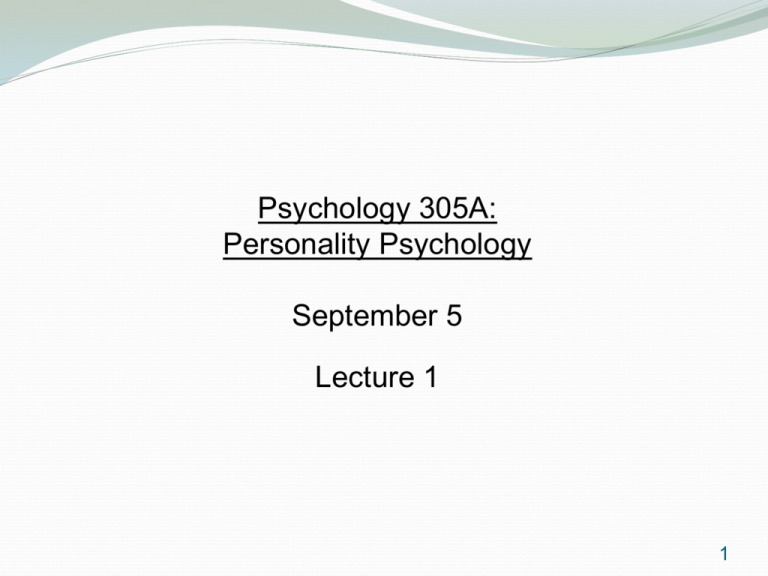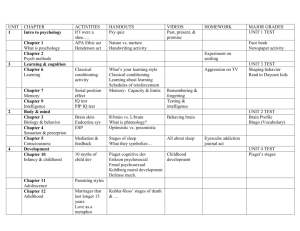Personality
advertisement

Psychology 305A: Personality Psychology September 5 Lecture 1 1 Muhammad Ali, 1942 2 John Lennon, 1940 - 1980 3 Karla Homolka, 1970 4 Course syllabus • Please read the course syllabus thoroughly. • Your support team: Sunaina Assanand, Boaz Saffer, Sam Rumak, Austin Lee, Gordon Yung. 5 • Course description: Eight theoretical perspectives on personality. Trait Biological Psychoanalytic Psychosocial Learning Cognitive Motive Self-actualization/determination 6 • Course format: Lectures. Activities. Discussion. Readings. Three case studies, each scheduled before an exam, opportunity for review: Jeffrey Dahmer, Adolf Hitler, Malcolm X. 7 • Course website: http://www.psych.ubc.ca/~assanand. Password: 305psychology. Slides will be posted after class. 8 • Textbook: Carver, S. C., & Scheier, M. F. (2012). Perspectives on Personality. Purchase the 7th edition. “Access card” provides access to a study guide. Optional. In the event of discrepancies, rely upon class material. 9 • Evaluation: Exams: 3 x 33.3% each (without paper); 3 x 25% (with paper). Multiple choice/open-ended extended response questions. Non-cumulative. Material presented in lecture and textbook. Paper: Optional. 25%. Psychobiography. Up to three theories of personality; self, family member, friend, public figure, fictional character. 10 In the event of illness, please notify me within 24 hours of an exam or the paper due date. After 24 hours, “0” on the exam and paper not accepted. 11 • Peer mentor program: Optional tutorial sessions, led by peer mentors. Discuss questions in small and large groups. Submit questions of concern or interest ahead of time. Assess, explore, collaborate! Dates and times TBA. 12 • Participation: Strongly encouraged and appreciated. Respect classmates’ efforts to contribute to class discussion. Refrain from dominating discussion. Positive and informative classroom environment. • The “?” bag: Questions, suggestions, comments. Anonymous. 13 • Missed classes and student contacts (spaces provided in syllabus): Name? Year of study? Major? Hometown? Reasons for enrolling in Psychology 305A? Interests and concerns related to this course? 14 • Laptop use: If used for inappropriate activities in class (e.g., “surfing”), sit in back three rows of classroom. • Requests for adjustment of grades and academic concession: Within 4 weeks of posting of grades. For medical, emotional, or personal problems, contact me before exam dates and paper due date. No accommodations after exams or paper submission. No changes in relative weight of course requirements or points added to increase final standing. 15 • Psychology Department’s policy on distribution of grades: For 300-level courses, required mean=66-70%, SD=13%. • Withdrawal dates: September 17 (no “W”), October 11 (with “W”). 16 Questions, concerns, comments? Let’s begin! 17 Introductory Concepts 1. What is personality? 2. Why study personality? 18 Learning Objectives • A list of the knowledge or abilities that you should acquire from the information discussed in each class period. • Use as a diagnostic tool to monitor your progress. • Create essay questions from the learning objectives to assess your mastery. 19 • Learning objectives are not presented in the textbook. Consider constructing learning objectives for each section of the textbook (e.g., what should I take away from this section?). 20 By the end of today’s class, you should be able to: 1. define the term “personality.” 2. identify the goals of personality psychology. 21 21 What is personality? • Class Exercise: Question: What is personality? Answer: Personality is …. Psychology 305 22 22 • Carver and Scheier (p. 4): “Personality is a dynamic organization, inside the person, of psychophysical systems that create the person’s characteristic patterns of behavior, thoughts, and feelings.” 23 23 • Noteworthy points about this definition: 1. “psychophysical” 2. “dynamic” 3. “organization” 4. “create” 5. “characteristic patterns” 6. “behavior, thoughts, and feelings” 24 24 Why study personality? • Personality psychology has three goals: 1. Descriptive goal. 2. Explanatory goal. 3. Predictive goal; particularly relevant to applied (e.g., clinical, military, corporate) settings. 25 25 By the end of today’s class, you should be able to: 1. define the term “personality.” 2. identify the goals of personality psychology. 26 26





